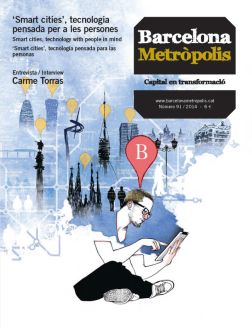Chronic illnesses account for between 70% and 80% of the cost of public health in OECD countries. New communication technologies will enable improvements in care and a reduction in expenses.
Currently, in Barcelona and the wider world, there are several pilot eHealth projects underway, using communication technologies in medicine for administrative, educational and clinical purposes. Here, Hospital Clínic de Barcelona and Barcelona Digital Centre Tecnològic have joined forces to develop new applications through the Barcelona Virtual Health Practice programme. “A chronic patient has very specific needs; we want to increase contact and reduce face-to-face visits,” explains Joan Escarrabill, director of the chronic care programme at Hospital Clinic.
The routine monitoring of chronic patients (with diabetes, heart failure or respiratory diseases, etc.) can be undertaken through mobile apps or internet consultations. Engineers from Barcelona Digital and doctors from Hospital Clinic have created an app for prescribing for and monitoring these kinds of patients, who do controlled exercises, like walking or going up and down stairs, with sensors connected to their mobile phones. The exercise data that doctors receive gives them an accurate picture of the patient’s physical performance. The app also plays a part in motivation: it sets up virtual routes and proposes activities suited to each patient. There is even “a little figure that is happy or sad, depending on what they do during the day”, explains Felip Miralles, head of health R+D in Barcelona Digital Centre Tecnològic. Although it seems simple, keeping the figure happy is motivating for the patients, the majority of whom are elderly. So far a pilot scheme has been run involving ten people, with really good results. “It increases the percentage of patients that do exercise: without the app 30% do; among those who had the app 70% stuck to it,” says Miralles. “Technology itself does not solve the problem, but it is useful within the context of a care package,” observes Escarrabill.
eConsult
eConsult, a pioneering scheme for virtual consultations carried out by twenty doctors and seventeen nurses in twelve primary healthcare centres (CAPs) in Barcelona, allows the consultations to take place via a digital platform created specifically for the project that guarantees data confidentiality. Medical staff receive an email alert for each new consultation and have 48 hours to respond. At the moment, however, response time is around nine hours.
In 2010, in collaboration with Telefònica, the Hospital del Mar started up a telemedicine project to monitor high-risk heart failure patients who are unable to go to the hospital or the CAP. At home, the patient has a touchscreen, a webcam, scales for weighing themselves and a blood pressure monitor. The data arrives at the hospital for monitoring and the visit takes place through videoconferencing. The nurse does 80% of the visits, according to the algorithms of the European guidelines, and leaves the cardiologist to do the validation and make the more sophisticated decisions. According to the preliminary results of the project, this device reduces mortality by 34%, decreases the cost per patient by 68% and patient satisfaction is much higher.
Shared medical records also enable alternative patient information management, in a way that could lead to comprehensive treatments, and even the early detection of some diseases. The nephrology service at the Vall d’Hebron University Hospital has developed a pioneering project, EPIRHOS, which, through a computer application integrated into the patient information management network, among other things, enables the detection of possible, previously undetected cases of kidney disease. It is calculated that between 10% and 15% of the population have undetected kidney disease.




